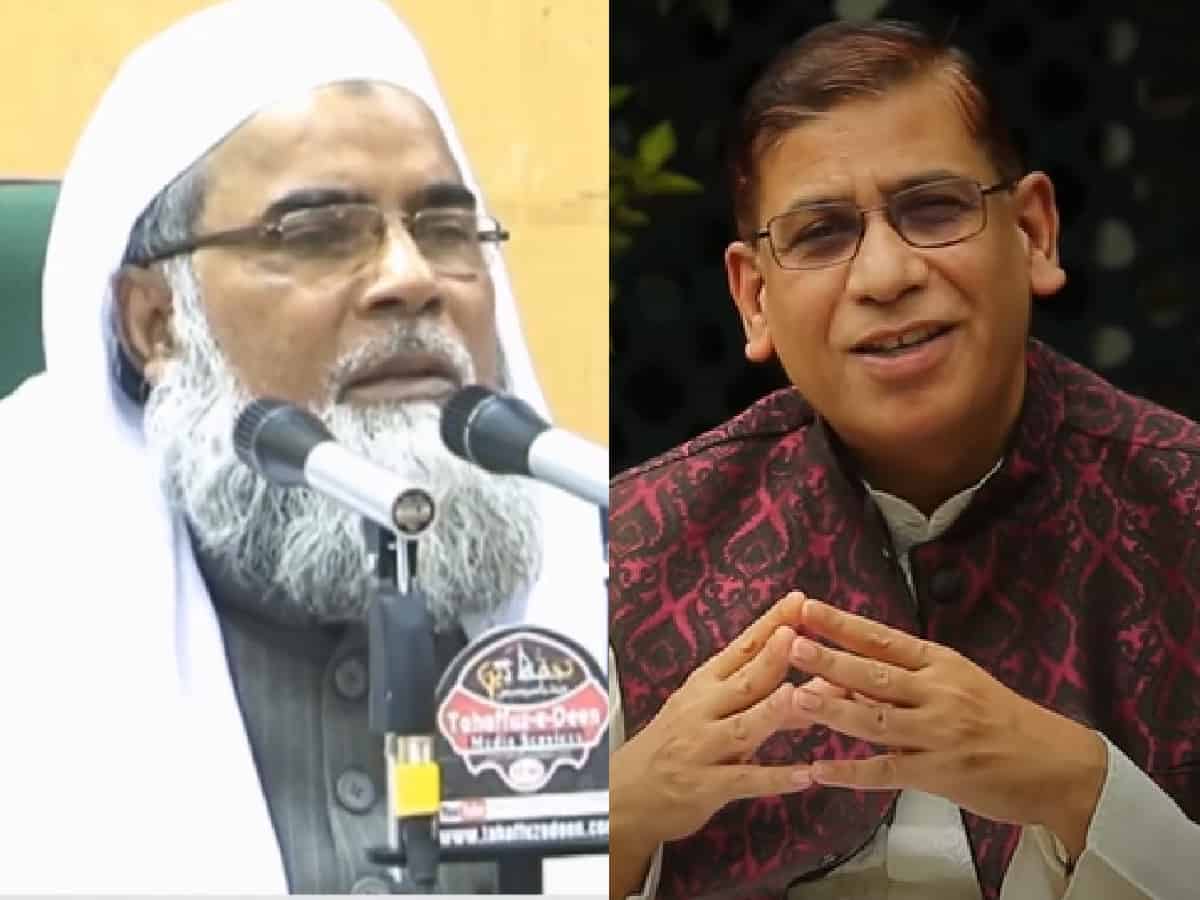
Hyderabad: What happens when a legal expert and a specialist of theology come together? Sparks are bound to fly. And that’s what exactly happened the other day with Prof. Faizan Mustafa, Vice Chancellor, NALSAR Law University and Maulana Khalid Saifullah Rahmani, Secretary, Muslim Personal Law Board, sharing the dais at a book launch programme. No, they did not spar. But each held on to his position on what is modern law and what is Shariah and Fiqh (Islamic jurisprudence).
Soon after Mustafa completed his address, the Maulana intervened to what he believed setting the record straight. Without mincing words he explained the Shariah position and mildly ticked off the VC for his interpretation of Hadith and Fiqh. “He might have said these things with sincerity but one can commit a mistake even being sincere,” Maulana Rahmani remarked.
Then he put the question to the audience and wanted to know, being Muslims, whether they considered the law of Parliament supreme or the command of Allah and His Messenger? Everyone said in one voice that they would abide by the divine command.
The occasion was the launch of the book – Answers By Prophet Mohammad, A Ready Reckoner compiled by Mohammad Abdul Rahim, a retired Doordarshan engineer. Dr. Rashid Naseem Nadvi, Professor of Arabic, EFLU, was also present.
Earlier in his speech, Mustafa said in the compilation of Hadith (the sayings of Prophet) lot of focus was given on the narrators and not on the content. Not much critical evaluation was done. Many things had crept in the Hadith literature which a court of law sees differently. Religious books and scriptures–be they of Hindu religion, Christianity or Jainism–should not be read like Articles of modern law.
It would be wrong to read a verse of the Quran like Article 14 of Constitution or Section 10 of the Contract Act. Hadith is not a book of law. It is a comprehensive book containing many things — stories, principles, morals. But it is definitely not enacted by any Parliament — Indian, British or American. “Hadiths are the source of law and not law themselves. Law is extracted from it,” Mustafa explained.
There is a methodology of reading law and it is different from that of the study of Hadith. As such there is a lot of confusion when they are quoted in the court of law. Translations of Quran and Hadith presented to court are not of good standard and this had a bearing on the verdict. In this connection he cited the recent court verdicts in respect of triple talaq, hijab and age of marriage.
There is some confusion over the authenticity of Hadith. The kind of research required is not done. The language used to translate them is not modern. “We can’t win cases on the basis of theology but law,” the NALSAR University VC said. He cautioned against taking Hadith or a verse of Quran as a modern enacted statutory law since they are two different things. “You can’t play football with the rules of cricket,” he said.
He cited some incidents of the Prophet’s life and said how the marriage of a couple was dissolved on the evidence of a woman who said she had breastfed both the man and women when they were children. “On the basis of single uncorroborated evidence the marriage was dissolved,” he remarked. In the same vein he wondered whether the Hadith literature quoted by Hazrath Ayesha, the Prophet’s wife, would be given half value since a woman’s evidence is considered half to that of man’s.
Stating that sin and crime were two different things, he said sin was concerned with theology and not law. Today adultery has been decriminalised by the court. But nevertheless it remained a sin. Not just sin it will have legal consequences too. If a husband or wife is involved in adultery it would become the ground for divorce.
Mustafa wanted Ulema to understand the principles of modern law and change the language of fiqh. Till then the confusion would prevail. For this he wanted the Ulema and law experts to sit together and sort out the matter. He further referred to the inbuilt flexibility in the Shariat Application Act and wanted Muslims to end rigidity to solve issues.
Maulana Rahmani said Shariah laws drawn from Quran and Hadith were supreme and they couldn’t be subordinate to any other law. There is no scope for change in them as they are ‘up-to-date’ till eternity. But ijtehad (independent reasoning) is different and there could be a change in it, if needed. He agreed with the suggestion that Ulema needed to know about the Indian Constitution and modern laws and judges and lawyers about Shariah laws.
Referring to the recent court judgments, Maulana Rahmani said they were devoid of justice most of the time since the opinion of Ulema was not being taken. The judiciary was familiar with the law of the land but it had no knowledge of Shariah. Therefore, it is necessary that the views of Ulema are taken when the issue involves the community. In this connection he recalled how the Muslim Personal Law Board was not in agreement with the Shah Banu judgement which was in conflict with Shariah.
Referring to the just released Hadith book, he said the Prophet of Islam encouraged questioning as it was a source of learning. Everybody questioned and a special session was earmarked for women to ask questions and seek clarification. No other religion encouraged its followers to question.
Maulana Rashid Naseem Nadvi called for greater interaction between judiciary and Ulema so as to remove the confusion over matters of Shariah. Mufti Omer Abedeen also spoke. Earlier, Rahim explained about his book and the methodology adopted by him in its compilation.
(A report on the book has been carried by siasat.com)
